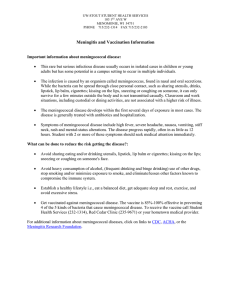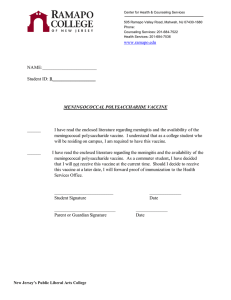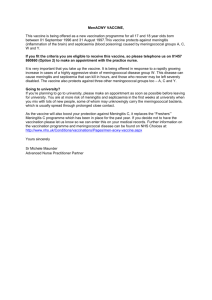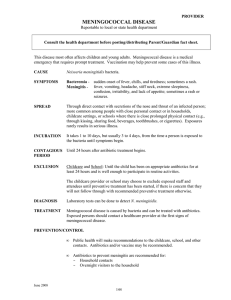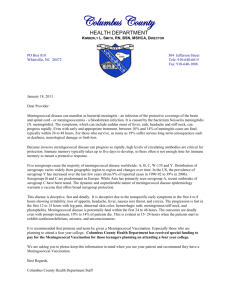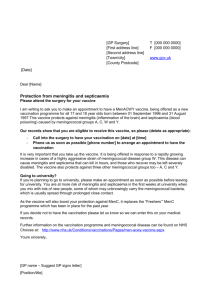Meningococcal Disease Who should get meningococcal Where can I get more
advertisement
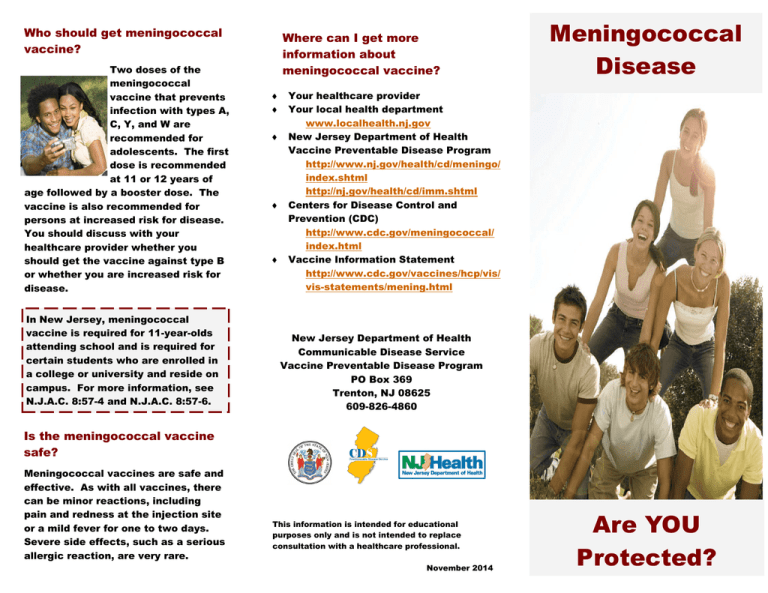
Who should get meningococcal vaccine? Two doses of the meningococcal vaccine that prevents infection with types A, C, Y, and W are recommended for adolescents. The first dose is recommended at 11 or 12 years of age followed by a booster dose. The vaccine is also recommended for persons at increased risk for disease. You should discuss with your healthcare provider whether you should get the vaccine against type B or whether you are increased risk for disease. In New Jersey, meningococcal vaccine is required for 11-year-olds attending school and is required for certain students who are enrolled in a college or university and reside on campus. For more information, see N.J.A.C. 8:57-4 and N.J.A.C. 8:57-6. Where can I get more information about meningococcal vaccine? Meningococcal Disease Your healthcare provider Your local health department www.localhealth.nj.gov New Jersey Department of Health Vaccine Preventable Disease Program http://www.nj.gov/health/cd/meningo/ index.shtml http://nj.gov/health/cd/imm.shtml Centers for Disease Control and Prevention (CDC) http://www.cdc.gov/meningococcal/ index.html Vaccine Information Statement http://www.cdc.gov/vaccines/hcp/vis/ vis-statements/mening.html New Jersey Department of Health Communicable Disease Service Vaccine Preventable Disease Program PO Box 369 Trenton, NJ 08625 609-826-4860 Is the meningococcal vaccine safe? Meningococcal vaccines are safe and effective. As with all vaccines, there can be minor reactions, including pain and redness at the injection site or a mild fever for one to two days. Severe side effects, such as a serious allergic reaction, are very rare. This information is intended for educational purposes only and is not intended to replace consultation with a healthcare professional. November 2014 Are YOU Protected? MENINGOCOCCAL VACCINE CAN PROTECT YOU AGAINST THIS DEADLY INFECTION What is meningococcal disease? Meningococcal disease refers to any illness caused by the type of bacteria (germs) called Neisseria meningitidis. Meningococcal disease may result in inflammation of the lining of the brain and spinal cord (meningitis) and/or a serious blood infection (septicemia). About 5-20% of people carry this type of bacteria in their nose and throat and do not get sick from them. But sometimes, Neisseria meningitidis can invade the body and cause meningococcal disease. Who gets meningococcal disease? Anyone can get meningococcal disease, but certain groups are at increased risk. These include: College students and military recruits living in dorms or barracks People with certain medical conditions or immune system disorders including a damaged or removed spleen People who may have been exposed to meningococcal disease during an outbreak International travelers Why should I be concerned about meningococcal disease? Meningococcal disease is serious; even with treatment, the disease may result in death. Of those who live, about 20% will lose their arms or legs, have problems with their nervous systems, become deaf, or suffer seizures or strokes. Early diagnosis and treatment are very important. How do people get meningococcal disease? The bacteria are spread from person-to-person through the exchange of saliva (spit) or nasal secretions. One must be in direct (close) contact with an infected person’s secretions in order to be exposed. Close contact includes activities such as: Living in the same household Kissing Sharing eating utensils, food, drinks, cigarettes These bacteria are not as contagious as the germs that cause the common cold or flu. The bacteria are not spread by casual contact or by breathing the air where a person with meningococcal disease has been. What are the symptoms of meningococcal disease? Common symptoms are: Confusion Fatigue (feeling very tired) Headache High fever Nausea Rash of dark purple spots Sensitivity to light Stiff neck Vomiting How can meningococcal disease be prevented? The best way to prevent meningococcal disease is to get vaccinated. There are two kinds of vaccines available that protect against 4 types of meningococcal disease known as A, C, Y, and W. There is a new vaccine that was just licensed to help prevent type B.
